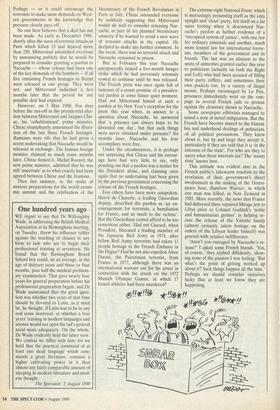Perhaps — or it could encourage the terrorists to make
more demands on West- ern governments in the knowledge that pressure clearly pays off.
No one here believes that a deal has not been made. As early as December 1986, shortly after the wave of terrorist attacks in Paris which killed 13 and injured more than 250, Mitterrand astonished everyone by announcing publicly that he would be prepared to consider granting a pardon to Naccache — whose release had been one of the key demands of the bombers — if all five remaining French hostages in Beirut were released in one group. They were not, and Mitterrand indicated a few months later that the period for any possible deal had expired.
However, on 5 May 1988, five days before the run-off in the presidential elec- tion between Mitterrand and Jacques Chir- ac, his 'cohabitational' prime minister, Chirac triumphantly announced the libera- tion of the last three French hostages. Rumours were rife that he had given a secret undertaking that Naccache would be released in exchange. The Iranian foreign minister claimed as much some months later. Chirac denied it. Michel Rocard, the new prime minister, admitted that he was still 'uncertain' as to what exactly had been agreed between Chirac and the Iranians.
Then last summer, in the midst of anxious preparations for the world econo- mic summit and the celebration of the bicentenary of the French Revolution in Paris in July, Chirac astounded everyone by suddenly suggesting that Mitterrand would do well to consider releasing Nac- cache as part of his planned bicentenary amnesty if he wanted to avoid a new wave of terrorist attacks in the capital. He declined to make any further comment. In the event, there was no terrorist attack and Naccache remained in prison.
But in February this year Naccache unexpectedly ceased a five-month hunger strike which he had previously solemnly vowed to continue until he was released. The French press was once again full of rumours of a secret promise of a presiden- tial pardon at some future quiet moment. Had not Mitterrand hinted at such a pardon at his New Year's reception for the press this year when, in answer to a question about Naccache, he answered that 'a prisoner can always hope to be liberated one day', but that such things were never obtained under pressure? Six months later, Naccache and his four accomplices were free.
Under the circumstances, it is perhaps not surprising that Chirac and his entour- age have had very little to say, only pointing out that a pardon was a matter for the President alone, and claiming once again that no undertaking had been given by the previous government concerning the release of the French hostages.
Few others have been more outspoken. Herve de Charette, a leading Giscardian deputy, described the pardon as 'an en- couragement for terrorists, a humiliation for France, and an insult to the victims'. But the Giscardians cannot afford to be too censorious either. Had not Giscard, when President, liberated a leading member of the Japanese Red Army in 1974, after fellow Red Army terrorists had taken 11 people hostage in the French Embassy in the Hague? Had he not also expelled Abou Dacud, the Palestinian terrorist, from France in 1977, although there was an international warrant out for his arrest in connection with the attack on the 1972 Munich Olympic Games, in which 17 Israeli athletes had been murdered? The extreme-right National Front, which is increasingly presenting itself as the only upright and 'clean' party, felt itself on a far surer footing when it denounced Nac- cache's pardon as further evidence of a 'two-speed system of justice', with one law for ordinary criminals and another, much more lenient law for international terror- ists, members of the government and its friends. The last was an allusion to the spate of amnesties granted earlier this year to politicians (actually on both the Right and Left) who had been accused of filling their party coffers, and sometimes their own pockets too, by a variety of illegal means. Perhaps encouraged by Le Pen, prisoners immediately went on the ram- page in several French jails to protest against the clemency shown to Naccache.
Some newspaper editorials managed to sound a note of moral indignation. But the French have become inured to the blatant lies and underhand dealings of politicians of all political persuasions. They know about it, but by and large they accept it, particularly if they are told that it is 'in the interests of the state'. For who are they to query what those interests are? The 'nanny state' knows best.
This attitude was evident also in the French public's lukewarm reaction to the revelation of their government's direct involvement in the sinking of the Green- peace boat, Rainbow Warrior, in which one man was killed, in New Zealand in 1985. More recently, the news that France had delivered three repaired Mirage jets to Libya prior to Colonel Gaddafi's 'noble and humanitarian gesture' in helping se- cure the release of the Valente family (almost certainly taken hostage on the orders of the Libyan leader himself) was greeted with relative indifference.
'Aren't you outraged by Naccache's re- lease?' I asked some French friends. 'Yes, of course,' they replied diffidently, show- ing none of the passion I was feeling: 'But what's the point of getting worked up about it? Such things happen all the time.' Perhaps we should consider ourselves lucky that at least we know they are happening.
















































 Previous page
Previous page